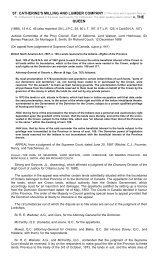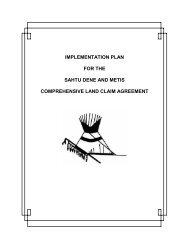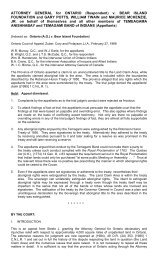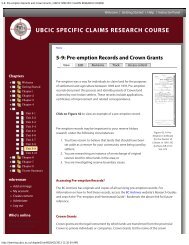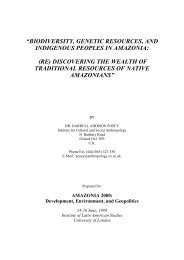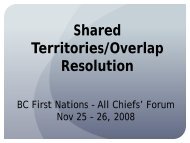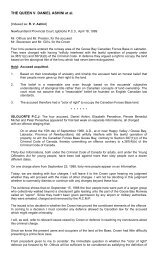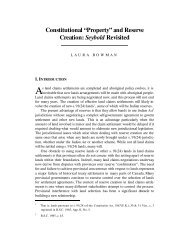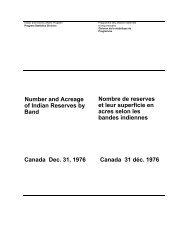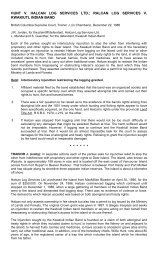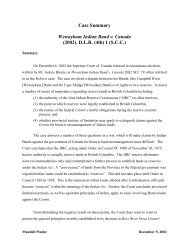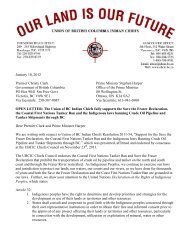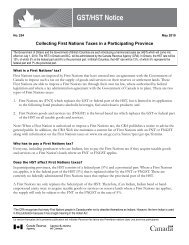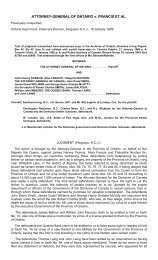Julie Cruikshank - Union of British Columbia Indian Chiefs
Julie Cruikshank - Union of British Columbia Indian Chiefs
Julie Cruikshank - Union of British Columbia Indian Chiefs
You also want an ePaper? Increase the reach of your titles
YUMPU automatically turns print PDFs into web optimized ePapers that Google loves.
Implementing Delgamuuk’w Conference Transcripts<br />
March 1999<br />
So these two questions, I think, which Leigh asked us to address, one is really what is history, what is oral history, what does<br />
this mean in the context <strong>of</strong> Delgamuuk'w? The second is what does this mean for people who are working on the ground<br />
in practical situations in communities? I think my conclusions would be, first, that we must be aware <strong>of</strong> the court's rules,<br />
but we can't let those court's rules define or constrict what is meant by oral tradition and oral history. Both speakers, I<br />
think, have addressed this in their presentations this morning. We must be aware, but always thinking about pushing those<br />
boundaries about how it can be used in ways that work, in ways that are important for the community and how history is<br />
part <strong>of</strong> a social process <strong>of</strong> history-making. It's not just sources, it is history-making, and history-making is done by living<br />
human beings who are a part <strong>of</strong> that history-making, and that goes on. History is being made now in communities in<br />
<strong>British</strong> <strong>Columbia</strong> and the Yukon and everywhere, and that oral history continues to be important. It is not just from the<br />
past, it's present and it's critical now.<br />
Secondly, the question about preserving and making sure that accounting for preservation. I think the important thing is<br />
thinking about preserving and creating settings for debate and discussions in communities where Elders are able to debate<br />
with one another about some <strong>of</strong> these issues, and to talk in ways that allow these issues to be discussed so that history is<br />
something that is discussed daily in communities and that is the record that continues to be a part <strong>of</strong>, eventually, the court<br />
record as well. The debates are important, the recording is important. And, again, in Yukon discussions at the Elders<br />
Festivals and at the Yukon International Storytelling Festival, which is held each year, there's really a conscious effort to<br />
record this and to make sure that it's always checked again with the speakers so that they are always aware <strong>of</strong> how their<br />
words might be recorded and transcribed and they have the final say on how those words can be used in particular kinds <strong>of</strong><br />
situations.<br />
I would just say, too, that the Yukon International Storytelling Festival, I think, is a remarkable setting, is a public space in<br />
which oral history is discussed, because -- and that continued during the land claims negotiations and it continues now --<br />
festivals like this are <strong>of</strong>ten interesting and good places to talk about political issues, because festivals are seen as places that<br />
are kind <strong>of</strong> safe places to speak because they are usually thought <strong>of</strong> as being for broad communities. They're not thought <strong>of</strong><br />
as charged political events, and yet they allow people to speak very strongly about the political and legal implications <strong>of</strong> the<br />
work they're doing and <strong>of</strong> their own notions <strong>of</strong> history in a public context where others are listening and are able hear oral<br />
tradition continuing to be passed on. So thank you.<br />
Hosted by the <strong>Union</strong> <strong>of</strong> BC <strong>Indian</strong> <strong>Chiefs</strong>.<br />
Please note that all transcripts are verbatim.<br />
3



